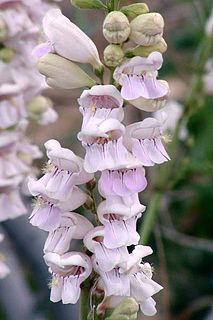
Penstemon, the beardtongues, is a large genus of roughly 250 species of flowering plants native mostly to the Nearctic, but with a few species also found in the North American portion of the Neotropics. It is the largest genus of flowering plants endemic to North America. Formerly placed in the family Scrophulariaceae by the Cronquist system, new genetic research has placed it in the vastly expanded family Plantaginaceae.

Penstemon palmeri, known by the common name Palmer's penstemon, is a species of perennial flowering plant in the genus Penstemon that is notable for its showy, rounded flowers, and for being one of the few scented penstemons. The plant, in the family Plantaginaceae, is named after the botanist Edward Palmer.
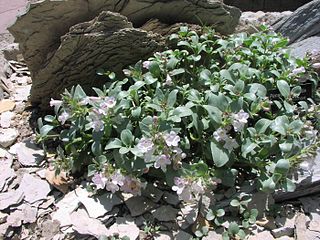
Penstemon debilis, the Parachute penstemon or Parachute beardtongue, is one of the rarest plants in North America, found only 5 places in the world, all of them located on the Roan Plateau in Garfield County, of Western Colorado. The Denver Botanic Gardens has the Parachute penstemon on display with other native plants of the Roan Plateau. The name Parachute comes from the small town in Colorado, Parachute, Colorado, close to where the plant can be found.

Penstemon digitalis is a species of flowering plant in the plantain family, Plantaginaceae. The flowers are white and are borne in summer. It is native to eastern Canada and the eastern and southeastern United States. Penstemon digitalis is the most widespread species of Penstemon east of the Mississippi River.
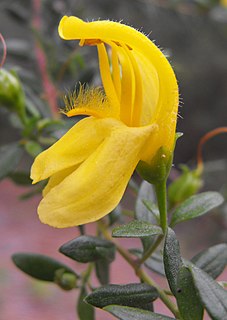
Keckiella antirrhinoides is a species of flowering shrub in the plantain family known by the common names snapdragon penstemon and chaparral beardtongue.
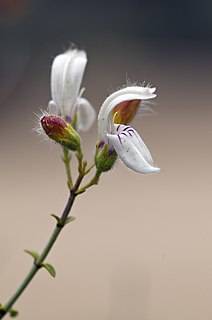
Keckiella breviflora is a species of flowering shrub in the plantain family known by the common name bush beardtongue.

Keckiella corymbosa is a species of flowering shrub in the plantain family known by the common names redwood keckiella, red beardtongue, and red shrubby penstemon.
P. gracilis may refer to:

Nothochelone is a monotypic genus of flowering plants in the plantain family containing the single species Nothochelone nemorosa, which is known by the common name woodland beardtongue. Originally described as Penstemon nemorosus, the plant is very similar in appearance to the penstemons, but was separated and placed into its own genus on the basis of slight morphological differences, such as winged seeds.

Penstemon clevelandii is a species of penstemon known by the common name Cleveland's beardtongue. It is native to southern California and Baja California, where it grows in mountain and desert habitat such as scrub, woodland, and chaparral. It is a perennial herb with upright, branching stems 70 centimeters in maximum height. The thick leaves are oval in shape, sometimes toothed, and 2 to 6 centimeters in length. The inflorescence produces tubular flowers with expanded, lipped mouths. The flower is pink to magenta in color, up to 2.4 centimeters in length, and somewhat glandular on the outer surface.

Penstemon floridus is a species of flowering plant in the plantain family known by the common names Panamint beardtongue and rose penstemon.
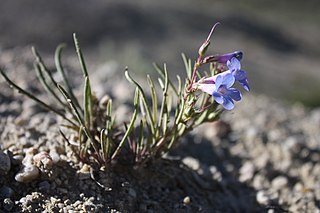
Penstemon penlandii is a rare species of flowering plant in the plantain family known by the common names Penland penstemon and Penland's beardtongue. It is endemic to Colorado in the United States, where it is known only from a strip of land about five miles long in central Grand County. There are two occurrences totalling about 8600 individuals. This is a federally listed endangered species of the United States.

Penstemon barrettiae is a species of flowering plant in the plantain family known by the common name Barrett's beardtongue or Barrett's penstemon. It is endemic to a small part of the Pacific Northwest of North America.

Penstemon clutei is a species of flowering plant in the plantain family known by the common name Sunset Crater beardtongue. It is endemic to Arizona, where it is known only from a system of volcanic cinder cones, including Sunset Crater, in Coconino County.

Penstemon scariosus is a species of flowering plant in the plantain family known by the common name White River beardtongue. It is native to Colorado, Utah, and Wyoming in the United States.

Penstemon eriantherus is a species of flowering plant in the plantain family known by the common names fuzzytongue penstemon and crested beardtongue. It is native to western North America, where it occurs in western Canada and the northwestern and north-central United States.

Penstemon linarioides is a plant species in the genus Penstemon. Its common names include toadflax penstemon, toadflax beardtongue and Colorado narrowleaf beardtongue. It grows in Nevada, Arizona, Utah, Colorado, and New Mexico.

Penstemon davidsonii is a species of penstemon known by the common name Davidson's penstemon, honoring Dr. George Davidson. It is native to North America from the Sierra Nevada Range in California and Nevada through the Coast and Cascade ranges of Oregon and Washington into British Columbia.

Penstemon pennellianus, often called the Blue Mountain beardtongue or Blue Mountain penstemon, is a species of beardtongue native to Washington and Oregon.


















